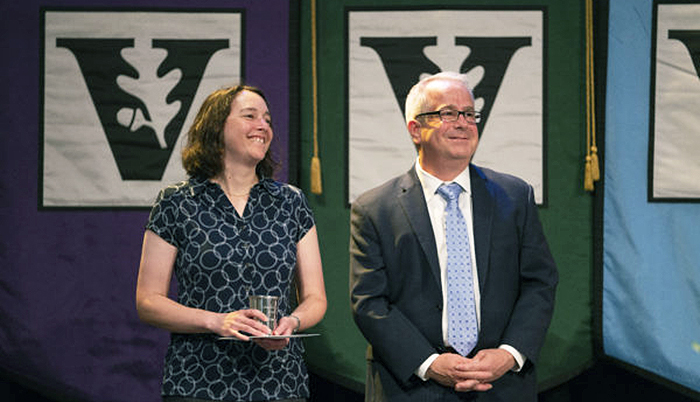
Sharon Weiss was one of seven Vanderbilt professors who won a Chancellor’s Award for Research at the Fall Faculty Assembly Aug. 22.
This award recognizes excellence in works published or presented in the last three calendar years. Honorees each receive $2,000 and an engraved julep cup.
Weiss, Cornelius Vanderbilt Professor of Electrical Engineering, received the award for her co-authored work, “Experimental Realization of Deep-Subwavelength Confinement in Dielectric Optical Resonators,” which was published in Science Advances.
“Sharon’s research on the spatial confinement of light marks an enormous leap forward in the interplay of optics and electronics,” said Interim Chancellor Susan R. Wente. “Sharon’s work has received significant praise from both technical and mainstream media outlets for its groundbreaking discoveries.”
On July 1, 2019, Weiss was appointed director of the Vanderbilt Institute of Nanoscale Science and Engineering (VINSE), one of the university’s leading trans-institutional ventures making critical contributions to science and society broadly.
Weiss’ research focuses on photonics, optoelectronics, nanoscience and technology, and optical properties of materials.
Her particular areas of interest include fundamental studies of light-matter interaction and photonic applications of nanomaterials, including the detection of small biomolecules in silicon and nanoporous silicon-based optical structures, and the ultrafast modulation of optical signals using hybrid silicon-VO2 ring resonators. Weiss also studies porous silicon nanoparticles and their applications for drug delivery.
Weiss is a fellow of the Society of Photo-Optical Instrumentation Engineers and the Optical Society as well as an Institute of Electrical and Electronics Engineers Photonics Society Distinguished Lecturer. She has been awarded the Presidential Early Career Award for Scientists and Engineers, the Army Research Office Young Investigator Award and the National Science Foundation CAREER Award. In 2016, her excellence as an educator was acknowledged with the Vanderbilt School of Engineering’s Excellence in Teaching Award.
Michael Goldfarb and Sokrates Pantelides were recognized at the assembly for 25 years of continuous service to Vanderbilt. They each received a chair bearing brass plates with their name and the Vanderbilt logo.
Goldfarb, H. Fort Flowers Professor of Mechanical Engineering, conducts research on the design and control of robotic devices and systems that interact physically with people, specifically with the intent to improve mobility, functionality, quality of life, or quality of care for people with physical disabilities.
He has published more than 200 papers on related topics, including papers that were awarded best-paper awards in 1997, 1998, 2003, 2007, 2009, and 2013, and papers that were finalists for best paper awards in 2015 and 2017.
As part of his effort to translate his research to individuals who can benefit from it, Goldfarb has been awarded more than 25 related U.S. patents, in addition to a similar number of international patents. These patents, and the technologies they describe, have been translated into several existing and emerging products, including the Indego exoskeleton, which enables individuals with paraplegia to stand and walk.
In recognition of his development of the Indego exoskeleton, Goldfarb was named by Popular Mechanics in 2013 as one of 10 Innovators Who Changed the World. His other honors include the Vanderbilt University Chancellor’s Award for Research in 2008, the National Institutes of Health National Institute of Biomedical Imaging and Bioengineering Edward Nagy Award in 2011, the Institute of Electrical and Electronics Engineers Wyss Institute Translational Award in 2012, and the IEEE Engineering in Medicine and Biology Society Outstanding Paper Award in 2013.
Goldfarb also is a professor of electrical engineering and professor of physical medicine and rehabilitation.
Sokrates Pantelides received a Fulbright Scholarship to Northern Illinois University where he earned a B.S. in physics with highest scholastic honors. He received a graduate fellowship at the University of Illinois at Urbana-Champaign where he earned a Ph.D. in theoretical physics in 1973.
After two years as a postdoctoral fellow at Stanford University, Pantelides joined the prestigious IBM Thomas J. Watson Research Center in New York. In 1979, he received an IBM Outstanding Innovation Award for breakthrough work on the theory of defects in semiconductors that was a major open issue in semiconductor physics. The following year, he was elected a fellow of the American Physical Society.
Starting in 1981, Professor Pantelides was invited 20 times by the Swedish Academy of Sciences to nominate candidates for the Nobel Prize in physics. At IBM, he served as a manager, a senior manager, and a program director.
Pantelides joined Vanderbilt University in 1994 as the William A. and Nancy F. McMinn Professor of Physics. He also accepted an appointment as Distinguished Visiting Scientist at Oak Ridge National Laboratory, where he has maintained a research group.
In 2010, he was appointed University Distinguished Professor of Physics and Engineering at Vanderbilt, with dual tenure in physics and electrical engineering.
He has served as Distinguished Professor of Physics at the University of the Chinese Academy of Sciences in Beijing, China, since 2016. In addition to the American Physical Society, Pantelides has been elected a Fellow of the American Association for the Advancement of Science, the Materials Research Society, and the Institute of Electrical and Electronics Engineers, and he has received several awards.
His research since 1994 spans a wide range of materials, semiconductors, superconductors, metals, ceramics, complex oxides, two-dimensional materials, and nanostructures, with emphasis on electronic, optical, and magnetic properties, device physics, and catalysis. He has published approximately 700 technical articles, edited nine books, and given more than 200 invited talks at conferences. He has trained approximately 80 graduate students and post-docs.
Contact: Brenda Ellis, (615) 343-6314
Brenda.Ellis@Vanderbilt.edu